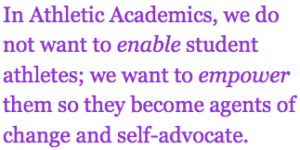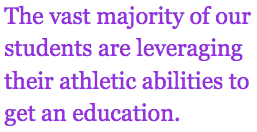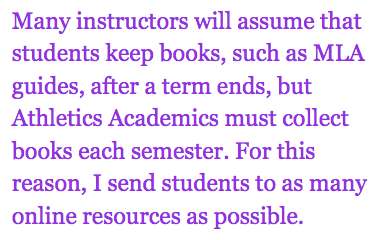Sarah Liles served as Writing Specialist for fourteen years, since 2002, before becoming the Administrative Assistant in Athletic Academics. She started her original position while working on her Ph.D. in the English program. Since then, she has adjuncted at TCU and Weatherford College, where she continues to teach part-time. During our interview, we discussed the purpose of the Athletic Academic Services offices, the perceptions of and reality of student-athletes, and the specific demands on their time.
For more about Athletic Academics, see their website.
What is the purpose of the Athletic Academic Services office? How does Athletic Academics differ from other academic services on campus?
The main reason we exist is to keep student-athletes eligible based on National Collegiate Academic Association (NCAA) requirements. The NCAA has very strict rules about how a student-athlete must proceed in their degrees. It is not just that they need to pass courses, but students also have to meet a certain percent of their degree credits every year. They also have to be certified from various departments on campus twice a year. So, our office coordinates all of that.
Aside from those lo gistical requirements, we provide an array of academic support. We have a wide variety of students who are athletes at TCU. Sometimes, we have students with incredibly high GPAs. For instance, one year, six out of seven women on the golf team had 4.0 GPAs. But, for the most part, people who have been in athletics throughout their lives have sometimes been pushed along by the system. So, some athletes were passed through courses, but not taught. What we do is provide services for student-athletes to catch up. However, Athletic Academic Services does not interfere with the academic process at TCU. We never want to imply to professors that they should pass an athlete.
gistical requirements, we provide an array of academic support. We have a wide variety of students who are athletes at TCU. Sometimes, we have students with incredibly high GPAs. For instance, one year, six out of seven women on the golf team had 4.0 GPAs. But, for the most part, people who have been in athletics throughout their lives have sometimes been pushed along by the system. So, some athletes were passed through courses, but not taught. What we do is provide services for student-athletes to catch up. However, Athletic Academic Services does not interfere with the academic process at TCU. We never want to imply to professors that they should pass an athlete.
For every student athlete who comes to TCU, no matter what their records indicate, we require a full diagnostic test. These tests have a writing section, questions about diet and home life as well as their fears and trepidations about academics. We have a learning specialist who reads these tests and diagnoses possible learning disabilities. Approximately one quarter of the student-athlete population has a diagnosed learning disability that requires accommodations.
In Athletic Academics, we do not want to enable student athletes; we want to empower them so they become agents of change and self-advocate. We never want to do everything for our athletes, although I think that is the impression that some people have of our office.
What are the backgrounds of student-athletes at TCU?
A great portion of our athletes are first-generation college students who have no concept of the requirements  of college. Many of these student-athletes have never had anyone in a position to mentor them. Not all, but some. Many of our student athletes come from a lower socioeconomic status. These students are using sports to get out of poverty. And they truly value education and want to get a good education. Another misconception of athletes is that they simply do not care about academics. There are some who feel that way, but the vast majority of our students are leveraging their athletic abilities to get an education. Many of the administrators in our office have done the same thing. Aside from myself, all of the advisors in Athletic Academics participated in college sports. Two of the administrators went on to professional football careers and then got master’s degrees. So, individuals in our office have done the same thing that these students are trying to do now—using sports to escape poverty and/or gain an education—and can help guide students through this process.
of college. Many of these student-athletes have never had anyone in a position to mentor them. Not all, but some. Many of our student athletes come from a lower socioeconomic status. These students are using sports to get out of poverty. And they truly value education and want to get a good education. Another misconception of athletes is that they simply do not care about academics. There are some who feel that way, but the vast majority of our students are leveraging their athletic abilities to get an education. Many of the administrators in our office have done the same thing. Aside from myself, all of the advisors in Athletic Academics participated in college sports. Two of the administrators went on to professional football careers and then got master’s degrees. So, individuals in our office have done the same thing that these students are trying to do now—using sports to escape poverty and/or gain an education—and can help guide students through this process.
What types of writing instruction do writing specialists provide?
We provide everything that the writing center provides, with a couple exceptions, specifically typing on students computers and online tutoring. Dr. Steven Sherwood at the William L. Adams Center for Writing trained me, and I have trained various other writing specialists who have come and gone over the years. We provide help with brainstorming, revising drafts, outlining, and research. One aspect that is particular to Athletic Academics is that we do not touch students’ laptops and rarely write on printed paper, aside from small grammatical errors. Students generate all the ideas in a tutoring session, and tutors just draw these ideas out through the Socratic method.
The reason for not touching laptops or conducting sessions via email is partially because of the NCAA. We want there to be no perception of academic fraud as well as no actual instances of academic fraud. For instance, if I were to type in a period on a student’s laptop, another person could walk by and assume that I am doing all the work for the student. We want no confusion about who has done the work. This is also the reason I do not adjunct at TCU while holding a position in Athletic Academics. If I were to have athletes in my courses, there could be the misperception that I would favor those students.
In your experience, what are some of the common writing issues for student-athletes? Can you deduce any patterns that might be helpful to composition instructors?
We have a very diverse student population. We have a lot of minority students and international students. Several
sports, such as tennis and track, gravitate toward international students. That means we have a lot of English as a second language (ESL) students. So, ESL students will have the same issues as any student learning English, such as putting adjectives after nouns or using masculine and feminine with adjectives and nouns. Also, depending on where students are from, concepts of citing sources are not the same. In the United States, we have the concept of intellectual property. For many other traditions, there are different or no citation styles. I have caught plagiarism in the past, and I have to explain to students that there are different cultural norms of citation.
When I find grammatical errors in student work, I teach as I go, rather than just edit. So, for instance, if I find a comma splice, I will try to explain this through extended metaphors. For instance, I might say that a comma is like a freshman on a team. Commas are not very strong and must be paired up with someone else—like a coordinating conjunction—to complete a play. [Laughs] I try to make grammar as visual as possible because most athletes are visual or kinesthetic learners, rather than aural. Metaphors help me create word-visuals for students.
What are some things you think that composition instructors need to know about working with student-athletes?
One thing that most people, composition instructors included, do not know is that athletes with “full book scholarships”—full scholarships that cover tuition and additional costs, such as textbooks—only receive books for the semester. Many instructors will assume that students keep books, such as MLA guides, after a term ends, but Athletics Academics must collect books each semester. For this reason, I send students to as many online resources as possible.
 Another thing that professors do not realize is the time constraints on a student-athlete. Athletes are required as freshman to be in the study hall for eight hours a week. We try to do tutoring and meeting with advisors during this time to make sure that they are working on academics. But, they literally have to sign in and sign out for eight hours each week. So, that is eight hours of commitment, it is academic, but still commitment. Students then have practice, weight training, games, and travel. Recently, the men’s basketball team got back from traveling for a game at 4:00 a.m. and had to be in class the next morning.
Another thing that professors do not realize is the time constraints on a student-athlete. Athletes are required as freshman to be in the study hall for eight hours a week. We try to do tutoring and meeting with advisors during this time to make sure that they are working on academics. But, they literally have to sign in and sign out for eight hours each week. So, that is eight hours of commitment, it is academic, but still commitment. Students then have practice, weight training, games, and travel. Recently, the men’s basketball team got back from traveling for a game at 4:00 a.m. and had to be in class the next morning.
Also, if athletes are not doing well in academics, they and their team can be punished for these failures. Every single sport is in competition with each other for the highest GPA. So, the coaches are not only pushing students athletically, but academically to gain prestige for individual teams. Coaches and Academic Athletics try to leverage the competitive nature of athletes for academic purposes. Most professors do not know that athletes are competing for grades.
In your opinion, what do the students you serve want composition instructors to know?
Again, time constraints. I definitely do not want to criticize any composition instructors, because I am one and know how hard it can be. But, I have seen some pretty difficult requirements for group assignments. For example, I saw a group project that had ten requirements to be completed within three weeks. For a group that had non-student athletes, I had the entire group in our office to help them develop their project. I have taught the group projects here and they are great and fun. I would suggest allowing more time in class for these group projects. Student-athletes, in particular, have nearly every hour of everyday scheduled for them, and it is more difficult for them to meet with group members outside of class, especially if they are in season.

